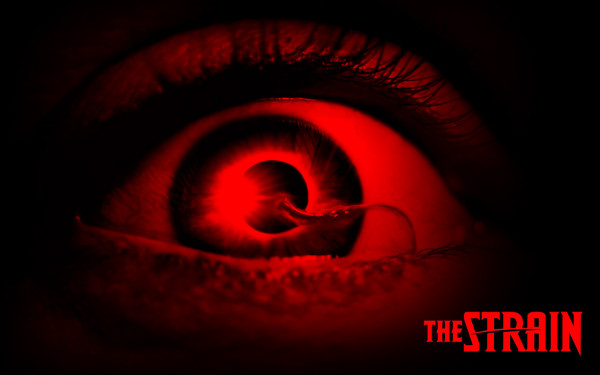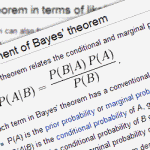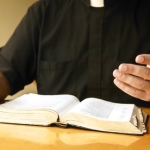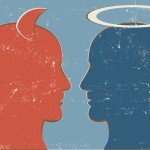The Human Strain
by Matthew Becklo
Filed under Culture, The Problem of Evil
In his dark 1977 novel Lancelot, novelist Walker Percy brings us into the walls of a mental institution to hear a man named Lancelot tell his life story, a tale of empty commercialism, salacious self-destruction, and one murderous act of vengeance. Now confined by the four walls of an asylum, he confides in his old friend, a priest and psychiatrist, about the “quest” that led him there and the truth of the world outside:
“In times like these when everyone is wonderful, what is needed is a quest for evil. You should be interested! Such a quest serves God’s cause! How? Because the Good proves nothing. When everyone is wonderful, nobody bothers with God…but suppose you could show me one ‘sin,’ one pure act of malevolence. A different cup of tea! That would bring matters to a screeching halt…‘evil’ is surely the clue to this age, the only quest appropriate to the age. For everything and everyone’s either wonderful or sick and nothing is evil.”
Like Chekov’s “Ward No. 6”, Percy’s story is meant to invert our normal understandings of the patient and the doctor, the madman and the well-adjusted citizen. Lancelot—despite evoking the reader’s just suspicion—hits a nerve with his diagnosis of modern America, especially in his central question: is there such a thing as an evil act, pure and simple? One that evades sociological or biological reduction? In short: does sin exist?
I thought about Lancelot as I started watching Guillermo del Toro ("Pan’s Labyrinth", "The Devil’s Backbone") and Carlton Cuse’s new vampire series "The Strain". (Interestingly enough, a character is seen reading Percy’s Lancelot in Cuse’s hit series "Lost".) The series is a new spin on vampirism at least insofar as it brings a sci-fi thriller element, complete with a panicky CDC, high-profile quarantines, and revolting autopsies. The first episode plays most like "The Andromeda Strain" than "Dracula"...
...that is, until we actually meet the creature behind all the mayhem. Soon it becomes abundantly clear that this “strain” is a tad worse than a viral outbreak, as victims begin losing their genitals, shooting elongated killer tongues out of their mouth, and feasting on the blood of their family members. Clearly, this is not Ebola—it’s something supernatural, a kind of force…something truly evil.
The lead character, the drowsy epidemiologist Ephraim Goodweather, eventually agrees to hear out an elderly Armenian man who insists that he knows what this is all about and how to stop it:
“This scourge we are now witnessing has existed for millennia. It is a corruption of both flesh and spirit. It ravages what is human in its victim and instills the raging thirst. That is his goal: to destroy humanity…I suppose you might call him patient zero. He spreads his virus through the parasites in his blood, driven by his horrible will...The Master excels at manipulation and disinformation, which is why they created a scapegoat…Take away the cape, the fangs, the accent. He’s a predator, a leech, a blemish.”
Abraham then describes seeing this “devil,” this “disease” with “an intelligence,” with his own eyes in one of the extermination camps during World War II. Late at night, Abraham watches the “strigoi”—which has that supernatural-yet-natural look and feel of del Toro’s creations—sneak into their cabin to feast. The next morning, Abraham tells his brother Jacob, who dismissed it as a nightmare. “Stop looking for monsters,” Jacob snaps. “We’re already surrounded by them.”
In this key scene, the gross-out, occasionally ridiculous tenor of The Strain transcends itself, and we can begin to read “the strain” as a metaphor for human evil—for sin.
First, there is the biological nature of the strain. It’s a purely negative force—a leeching privation of the good—that passes from person to person like an infection. Father Robert Barron, in his review of "World War Z<", explains the connection:
“Original sin is passed on from generation to generation, ‘propagatione et non imitatione’ (by propagation and not by imitation)…sin is not so much a bad habit that we pick up by watching other people behave, rather, it is like a disease that we inherit or a contagion that we catch…addressed only through the intervention of some medicine or antidote that comes from the outside.”
Also, there is the origin of the strain. It’s fitting that a mysterious Jewish character (Abraham, of all names) is the one to explain this origin, as Genesis, Exodus, and Leviticus read like an epidemiological traceback of sin. (The mention of a “scapegoat” is striking too, given the role the scapegoat played in ancient Jewish rites of atonement.) Moreover, Abraham’s description of “the Master”—a manipulator and deceiver driven by an inflated will to infect and destroy humanity—rings a bell or two.
Lastly, there is the effect of the strain on its hosts. Again, Father Barron’s review of "World War Z" is fitting:
“If sin were just a bad habit, then it wouldn’t reach very deeply into the structure of the self; but were it more like a contagion, it would insinuate itself into all the interrelated systems that make up the person…sin causes a falling-apart of the self, a disintegration of mind, will, emotions, and the body, so that the sinner consistently operates at cross-purposes to himself.”
Likewise, the strain causes a corruption of both “flesh and spirit” in its hosts: their internal organs shrivel up; their eyes become cold and lizard-like; their rational mind vanishes; their will is squelched, driving them only to use and discard their next victim; and most strikingly, they are driven to hurt the ones they love first.
This corruption of love is an especially horrifying—and apparently central—element of the story, one that perhaps calls sin to mind the most. The first recited words of the first episode touch on the subject:
“Hunger is the most important thing we know, the first lesson we learn. But hunger can be easily quieted down, easily satiated. There is another force, a different type of hunger, an unquenchable thirst that cannot be extinguished. Its very existence is what defines us, what makes us human. That force is love.”
If love is what makes us most human, than the corruption of love by the strain is what makes us most inhuman. To the Master’s scheming assistant, Thomas Eichorst, it’s the other way around—love corrupts, and the strain liberates. “What I find fascinating is how love is considered a gift, a blessing,” he says as he tortures one of his victims, “with no acceptance to the fact that it also binds, chokes, and strangles.”
With all of this in mind, it’s no surprise to learn that Carlton Cuse and Guillermo del Toro are both Catholic. In fact, the explicit Catholic references in the show are numerous: holy water, a rosary, a Roman collar, a Mary candle, and the sign of the Cross are all seen or mentioned, most often as a kind of weaponry vis-à-vis the strain.
In an interview with Busted Halo, Cuse confesses that his Catholic faith is “very important” to him, describing the interaction of faith and storytelling in this way:
“I think religion becomes most meaningful in people’s lives when it’s told in the form of stories where people can connect…in a lot of ways the Bible is a great story, and you find the meaning underneath that, but I think its relevance is not just because of the embedded meaning, it’s also because the stories are so good.”
Del Toro also discussed his own religious background in the Wall Street Journal:
“My basic substance is Catholic…It was very much intertwined with the way I wrote the book. It is an incredibly powerful way of mythologizing about good and evil…One of my favorite books, and one of the most mysterious books in the Bible, is the Book of Job. I thought it would be great for the character of [Ephraim Goodweather] to be sort of the chosen one, but to be taken apart by destiny, point by point, until he finds the voice of God in ways that are very subtle.”
Of course, the attitude toward sin reflected in "The Strain" has its critics. On one reading held by many atheists today, malevolent acts are a holdover from millennia of animal ancestry; these are not “evil” so much as “defective” behaviors that, countered with reason, science, and education, will sizzle and shrivel under the hot light of progress like del Toro’s vampires. Like Hazel Motes in Wise Blood, they proclaim that there can be no redemption from sin, because there was never any sin to begin with.
But has history borne this out? In the mid-nineteenth century, Dostoevsky was already countering this dream of an Enlightenment “utopia” with his “Underground Man” who, as William Barrett explains:
“…Might die of boredom, or out of the violent need to escape this boredom start sticking pins in his neighbor – for no reason at all, just to assert his freedom. If science could comprehend all phenomena so that eventually in a thoroughly rational society human beings became as predictable as cogs in a machine, then man, driven by this need to know and assert his freedom, would rise up and smash the machine.”
Dostoevsky, it turns out, was something of a prophet. Just when we hoped to see the dawn of universal brotherhood, we saw instead a torrent of bloodshed and mass murder unparalleled in recorded history. In the horror of World War II, the raging waters of the irrational rose up once again; and through the evolutionary ethos of Nazism, Abraham met the Master face to face. Man, one Roman playwright wrote, is man’s wolf—and nowhere is this more evident than in the twentieth century.
Today, our digital age only magnifies the increasingly random horrors at home and abroad. Love, peace, “coexist!”—these are the catchphrases we hear (and say) over and over. But is there anything in such short supply? As anthropologist René Girard puts it in his new book: “Why is there so much violence in our midst? No question is more debated today. And none produces more disappointing answers.”
The “human strain” is self-evident down through the centuries. But the question remains: is it sin? The term seems to presuppose an objective moral order grounded by God. But as Lancelot saw it, the quest for sin has precious little to do with these things. Instead, it’s about observing the world as it is, openly and without prejudice, to see whether pure, irreducible evil—whatever you want to call it—is a fiction. Unfortunately, we don’t have to travel very far in this quest. We don’t even have to take a single step.
Many will be tempted to write off "The Strain" as a mindless entertainment. But I think it does something more: it paints a picture of the evil that really and truly infects the world, the kind that—once exposed within—impels its host to don sackcloth and ashes, and whisper with that underground dweller, to no one in particular: “I am a sick man…I am a wicked man…”
Related Posts
Note: Our goal is to cultivate serious and respectful dialogue. While it's OK to disagree—even encouraged!—any snarky, offensive, or off-topic comments will be deleted. Before commenting please read the Commenting Rules and Tips. If you're having trouble commenting, read the Commenting Instructions.













